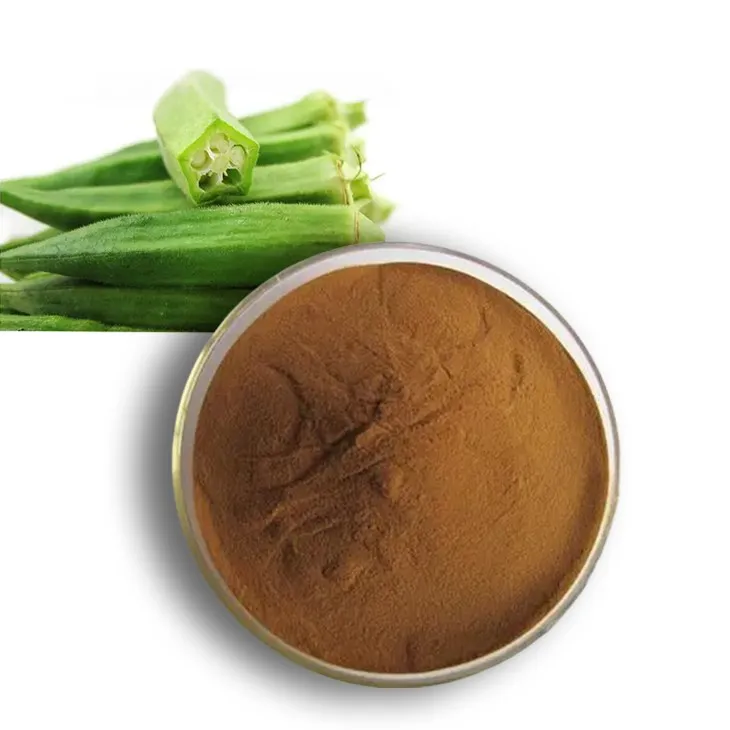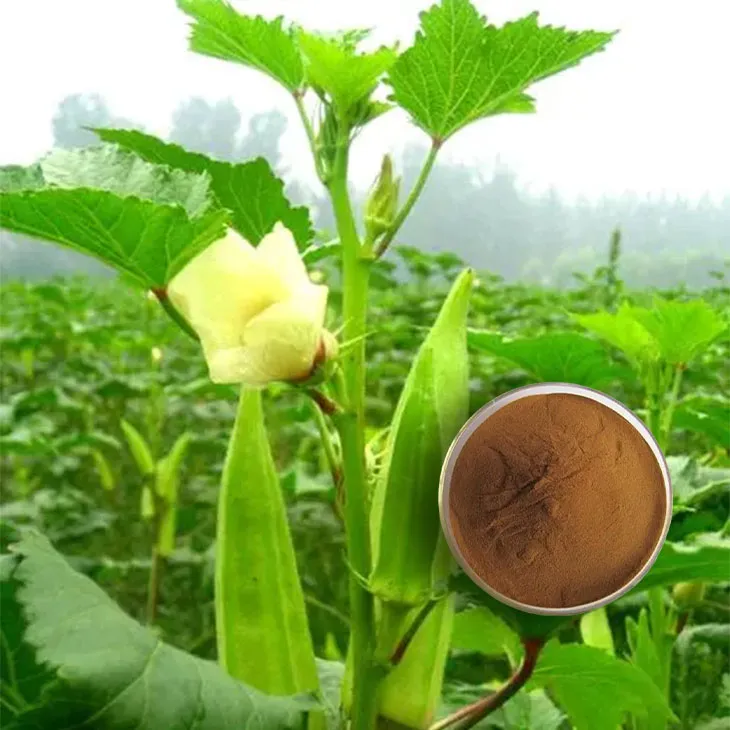- 0086-571-85302990
- sales@greenskybio.com
Okra extract: nature's best - kept secret.
2024-11-12

Introduction
In the vast world of natural products, the kiwifruit extract stands out as a hidden gem waiting to be fully explored. Kiwifruit itself is known for its delicious taste and high nutritional value. However, the extract derived from it holds even more potential in various aspects, from health benefits to applications in the food and beverage industry. This article will take a deep dive into the world of kiwifruit extract, uncovering its multiple functions and the mystery behind it.

Composition of Kiwifruit Extract
The kiwifruit extract is rich in a variety of bioactive compounds. One of the most notable components is vitamin C. Kiwifruit is already well - known for being a great source of vitamin C, and this vitamin is highly concentrated in the extract. Vitamin C is an antioxidant that plays a crucial role in protecting the body's cells from damage caused by free radicals. It also helps in collagen synthesis, which is important for skin health, wound healing, and maintaining the integrity of blood vessels.
Another important component is polyphenols. These are plant - based compounds that have antioxidant, anti - inflammatory, and anti - microbial properties. In kiwifruit extract, polyphenols contribute to its overall health - promoting effects. They may help in reducing the risk of chronic diseases such as heart disease, cancer, and neurodegenerative disorders.
The extract also contains actinidain, an enzyme that can aid in digestion. Actinidain helps break down proteins, which can be beneficial for those with digestive issues. It can also be used in the food industry to tenderize meat.

Health Benefits of Kiwifruit Extract
Regulating Blood Sugar Levels
One of the potential health benefits of kiwifruit extract is its role in regulating blood sugar levels. Some studies suggest that certain compounds in the extract may help improve insulin sensitivity. Insulin is a hormone that is responsible for regulating the amount of glucose in the blood. When insulin sensitivity is improved, the body can more effectively use insulin to transport glucose from the bloodstream into cells, where it can be used for energy or stored for later use. This can be particularly beneficial for people with diabetes or those at risk of developing diabetes.
For example, a study on diabetic rats showed that when given kiwifruit extract, their blood sugar levels were more stable compared to the control group. While more research is needed in humans, these initial findings are promising.
Reducing Inflammation
The anti - inflammatory properties of kiwifruit extract are also of great significance. Inflammation is a natural response of the body to injury or infection, but chronic inflammation can lead to a variety of health problems, including arthritis, heart disease, and certain cancers.
The polyphenols and other bioactive compounds in the extract work together to reduce inflammation. They can inhibit the production of inflammatory cytokines, which are molecules that play a key role in the inflammatory response. In a clinical trial, participants who consumed kiwifruit extract regularly showed a reduction in markers of inflammation in their blood, such as C - reactive protein.
Boosting the Immune System
With its high content of vitamin C and other antioxidants, kiwifruit extract can also help boost the immune system. Vitamin C is essential for the proper functioning of the immune system as it helps in the production and function of white blood cells, which are the body's defense against infections.
During cold and flu seasons, consuming kiwifruit extract may help reduce the severity and duration of illness. Additionally, the antioxidant properties of the extract can protect the immune cells from oxidative damage, ensuring their optimal performance.
Supporting Digestive Health
As mentioned earlier, the actinidain enzyme in kiwifruit extract is beneficial for digestion. It can help break down proteins more efficiently, which can improve overall digestive function. People with indigestion or malabsorption issues may find relief by consuming kiwifruit extract.
Furthermore, the fiber content in kiwifruit, which is also present in the extract to some extent, can promote regular bowel movements and prevent constipation. It can also support the growth of beneficial gut bacteria, which are important for maintaining a healthy gut microbiome.

Applications in the Food and Beverage Industry
Adding Flavor
In the food and beverage industry, kiwifruit extract can add a unique and refreshing flavor. It has a sweet and tangy taste that can enhance the flavor profile of a wide range of products. For example, it can be used in fruit juices, smoothies, and yogurt to give them a more complex and interesting taste.
The flavor of kiwifruit extract is distinct and can be used as a natural alternative to artificial flavors. It can also be combined with other fruit extracts to create new and exciting flavor combinations.
Adding Nutrition
Aside from flavor, kiwifruit extract can also add nutrition to food and beverage products. With its high content of vitamins, minerals, and bioactive compounds, it can enhance the nutritional value of products. For instance, adding kiwifruit extract to breakfast cereals or energy bars can provide an extra boost of vitamins and antioxidants.
In the beverage industry, it can be used to create functional drinks that not only taste good but also offer health benefits. For example, a kiwifruit - based sports drink could provide hydration, energy, and immune - boosting properties.
How is Kiwifruit Extract Produced?
The production of kiwifruit extract typically involves several steps. First, high - quality kiwifruits are selected. These fruits should be ripe and free from any signs of damage or disease.
1. Cleaning: The selected kiwifruits are thoroughly washed to remove any dirt, debris, or pesticides on the surface.
2. Peeling and Pitting: The outer skin of the kiwifruit is removed, and the seeds are also taken out if necessary.
3. Extraction: There are different methods for extraction, such as solvent extraction or mechanical extraction. In solvent extraction, a suitable solvent, such as ethanol or water, is used to extract the bioactive compounds from the kiwifruit pulp. Mechanical extraction, on the other hand, may involve pressing the kiwifruit to obtain the juice, which can then be further processed to obtain the extract.
4. Concentration and Purification: The extracted liquid is then concentrated to increase the concentration of the bioactive compounds. Purification steps may also be carried out to remove any impurities or unwanted substances.
5. Packaging: The final kiwifruit extract is packaged in suitable containers, such as bottles or sachets, to preserve its quality and freshness.
Future Prospects of Kiwifruit Extract
The future looks bright for kiwifruit extract. As more research is conducted on its health benefits, there is likely to be an increased demand for it in the health and wellness market. It could potentially be developed into new dietary supplements or functional foods.
In the food and beverage industry, there is also room for innovation. New products featuring kiwifruit extract could be introduced, targeting different consumer segments. For example, there could be kiwifruit - extract - based products for children, athletes, or the elderly.
However, there are also challenges that need to be addressed. For instance, standardizing the production process to ensure consistent quality of the extract, and conducting more in - depth research to fully understand its mechanisms of action and potential side effects.
Conclusion
In conclusion, kiwifruit extract is truly a hidden gem in nature. It offers a wide range of health benefits, from regulating blood sugar levels to reducing inflammation and boosting the immune system. In the food and beverage industry, it can add both flavor and nutrition to products. With further research and development, it has the potential to make a significant impact in the fields of health, nutrition, and food technology. As consumers become more health - conscious and interested in natural products, kiwifruit extract is likely to gain more attention and recognition in the future.
FAQ:
What are the unique compounds in kiwifruit extract?
Kiwifruit extract contains various unique compounds. For example, it has vitamins like vitamin C, which is in a relatively high amount. It also contains certain types of polyphenols and enzymes. These compounds contribute to its multiple functions such as antioxidant properties.
How exactly does kiwifruit extract regulate blood sugar levels?
Some components in kiwifruit extract may interact with the body's metabolic processes related to blood sugar. It might influence insulin sensitivity or the way the body processes carbohydrates. However, more research is needed to fully understand the exact mechanisms. It could potentially slow down the absorption of sugars in the digestive tract, thus helping to regulate blood sugar levels in a more stable manner.
Can kiwifruit extract be used in all types of food and beverage products?
While kiwifruit extract can be used in a wide variety of food and beverage products, there are some limitations. In some cases, its flavor and chemical properties may not be compatible with certain products. For example, in highly acidic products, it may react differently or lose some of its beneficial properties. Also, in products with very specific flavor profiles, the addition of kiwifruit extract may overpower or clash with the existing flavors. However, in most common food and beverage categories like juices, smoothies, and some baked goods, it can be a great addition.
What evidence is there for the anti - inflammatory effects of kiwifruit extract?
There have been some in - vitro and in - vivo studies. In - vitro studies have shown that the polyphenols in kiwifruit extract can inhibit certain inflammatory markers. In - vivo studies on animals have also indicated that it can reduce inflammation in tissues. However, more research on human subjects is required to firmly establish the anti - inflammatory effects in humans. Some observational studies in humans have also suggested a correlation between kiwifruit consumption and reduced inflammation, which provides some circumstantial evidence for the anti - inflammatory properties of its extract.
How is kiwifruit extract produced?
Kiwifruit extract is typically produced through a process that starts with fresh kiwifruits. First, the fruits are washed and sorted. Then, they are crushed to obtain a pulp. The pulp may be subjected to extraction using solvents like water or ethanol. After extraction, the resulting liquid is purified to remove impurities such as fibers and other unwanted substances. The purified extract is then concentrated to get the final kiwifruit extract product, which can be in the form of a liquid, powder, or other forms depending on the intended use.
Related literature
- The Nutritional and Functional Properties of Kiwifruit Extracts"
- "Kiwifruit Extract: A Promising Ingredient in Functional Foods for Health Promotion"
- "In - depth Analysis of the Compounds in Kiwifruit Extract and Their Biological Activities"
- ▶ Hesperidin
- ▶ citrus bioflavonoids
- ▶ plant extract
- ▶ lycopene
- ▶ Diosmin
- ▶ Grape seed extract
- ▶ Sea buckthorn Juice Powder
- ▶ Beetroot powder
- ▶ Hops Extract
- ▶ Artichoke Extract
- ▶ Reishi mushroom extract
- ▶ Astaxanthin
- ▶ Green Tea Extract
- ▶ Curcumin Extract
- ▶ Horse Chestnut Extract
- ▶ Other Problems
- ▶ Boswellia Serrata Extract
- ▶ Resveratrol Extract
- ▶ Marigold Extract
- ▶ Grape Leaf Extract
- ▶ blog3
-
Cranberry Plants and Skin - care Products.
2024-11-12
-
Uridine-5'-monophosphate Disodium salt
2024-11-12
-
Grape Leaf Extract
2024-11-12
-
Cocoa Extract
2024-11-12
-
Green coffee bean Extract
2024-11-12
-
Polygonum multiflorum extract
2024-11-12
-
Centella Asiatica Extract
2024-11-12
-
Passionflower Extract
2024-11-12
-
Red Date Extract
2024-11-12
-
Coix Seed Extract
2024-11-12
-
Tinospora cordifolia extract
2024-11-12





















